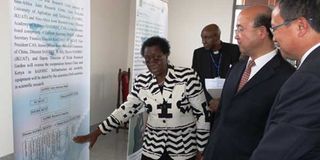Chinese govt builds Sh3bn research centre at JKUAT

JKUAT VC Prof Mabel Imbuga (left), explains the organisational structure of the Sino-Africa Joint Research Centre (Sajorec) to Chinese Ambassador to Kenya, Dr Liu Xian Fa (centre) when he officiated handed over the Sh3 billion research centre at JKUAT Main Campus in Juja on September 26, 2016. PHOTO | MARY WAMBUI | NATION MEDIA GROUP
What you need to know:
- VC Imbuga said the centre will educate the society on the importance of biodiversity and conservation.
- Dr Xianfa said the research centre is the first ever comprehensive facility funded by the Chinese government in Africa.
- The centre, built in a period of two years and five months, provides guests with a view of exotic and local plants.
- The exotic plants were imported from different parts of the world.
China’s ambassador to Kenya Dr Liu Xianfa on Monday officially handed over a Sh 3 billion modern research centre and botanical garden funded by the Chinese government to the Jomo Kenyatta University of Agriculture and Technology (JKUAT).
The research centre built on a 40-acre piece of land is equipped with a botanical garden, a modern agriculture demonstration zone, specialist research laboratories, administration offices, and conference hall as well as accommodation facilities.
Speaking during the handing over ceremony at the university's main campus in Juja, Kiambu County, JKUAT’s Vice-Chancellor Mabel Imbuga said the facility will foster research while boosting human capacity in the university.
It will, at the same time, educate the society on the importance of biodiversity and conservation, she added.
"The modern agriculture demonstration zone will showcase modern agricultural techniques and ways of managing dry lands in Kenya and Africa as a whole," added Prof Imbuga.
Dr Xianfa said the research centre is the first ever comprehensive facility funded by the Chinese government in Africa.
CHINA'S SUPPORT TO KENYA
"Over the past few decades, China has provided a lot of support to Kenya including the building of schools, hospitals, education centres, drinking water wells, hydro power stations and providing medical equipment to hospitals, tents to refugees, vehicles to wildlife service and scholarships to officials and technicians, but amongst all these projects and training opportunities the Sino-Africa Joint Research Centre is the most unique and significant project we have ever supported," said Dr Xianfa.
The centre, built in a period of two years and five months, provides guests with a view of exotic and local plants in portions divided by cemented pathways and small water points complete with sitting areas for visitors to rest as they tour the vast garden.
The exotic plants imported from different parts of the world will enable researchers from different parts of the world conduct research from the centre while in the country.





